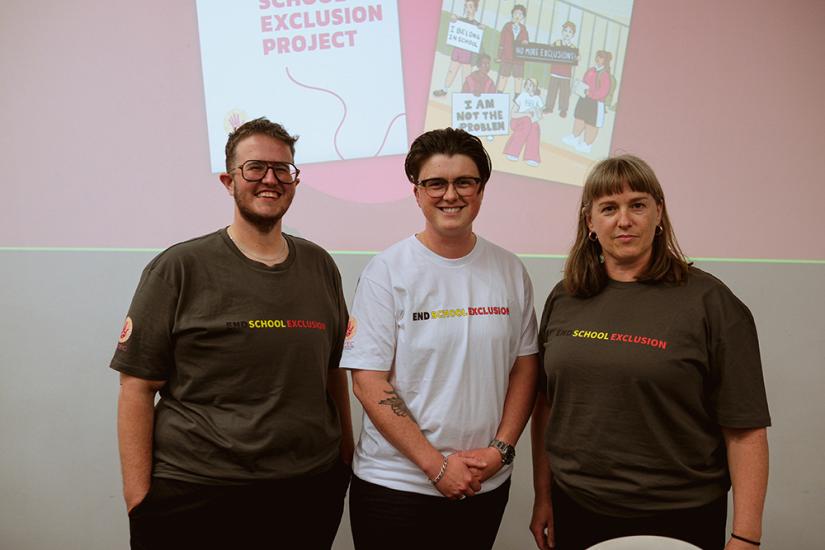Harsh school discipline, particularly suspensions and expulsions, may unfairly target some students and increase their likelihood of contact with the criminal justice system, writes Archie Thomas.

Dr Archie Thomas
If you’re an Aboriginal or Torres Strait Islander kid, schools are much more likely to suspend or expel you.
I recently co-authored the School Exclusion Project, led by the National Indigenous Youth Education Coalition (NIYEC). As we explain, a quarter of all suspensions in NSW are directed at Aboriginal or Torres Strait Islander students, even though this group represents only 8% of all student enrolments. The proportion is similar in Queensland; generally, the use of disciplinary exclusion measures is increasing in schools across Australia.
Data from other states show that school exclusion is also a problem for other racialised students, such as Maori, Pasifika and African students, as well as students with a disability, those in out-of-home care, and children who are neurodivergent, economically disadvantaged, or LGBTIQ+.
We know that school exclusion doesn’t work to improve student behaviour. It is well-documented that it exacerbates behavioural problems and diminishes academic engagement.
Excluding children from school is also a strong predictor that they will go on to become involved with the justice system.
We know from other studies that students are often punished for engaging in fights in response to unaddressed bullying, racism and discrimination. Students also report conscious or unconscious bias on teachers’ behalf.
Our report examines how school exclusion has occurred through history. It shows that the exclusion of Aboriginal and Torres Strait Islander students has been a constant feature of the Australian education system since colonisation.
Police have long been involved in the schooling of Aboriginal and Torres Strait Islander children. Historically, schools were sites of forced removals and in some locations police worked together with schools to monitor Indigenous families. Police have been employed by some states at various times to enforce school attendance.
Today, children who are suspended or expelled are more likely to come into contact with police, especially if they don’t have a safe home and sit out the school day on the streets.
Evidence is emerging from the United States, the United Kingdom and elsewhere that there is a ‘school-to-prison’ pipeline, where repeated school exclusions gradually shepherd students away from positive school connections towards criminalisation. There is a lack of publicly available data on school exclusion in Australia, but the over-representation of marginalised groups in prison suggests the same may be happening in Australia.
The Closing the Gap strategy includes reducing expulsions for Aboriginal and Torres Strait Islander students, and the Disability Royal Commission identifies school discipline as an area of reform.
However, a NSW government review found its policy aiming to cap suspensions and expulsions of students in NSW schools was resisted by teachers who were concerned about their ability to manage student behaviour.
In a stressed education system grappling with teacher shortages and disengaged students, we’re faced with a key policy challenge: how do you stop marginalised children from being excluded from school and becoming involved with the justice system, while at the same time supporting teachers to properly support students?
My ongoing work is investigating new options that may solve this conundrum.
One solution may be to use the principles of restorative justice as an alternative to school exclusion for Indigenous children. This would refocus justice funding from prison to social services that work to prevent crime and create opportunities for marginalised youth. While this has been done outside schools, my research will investigate the possibility of reforming policy inside schools. As well, building on my previous research on Indigenous controlled-schools, I am exploring the use of alternative schooling systems that are not focused on harsh discipline.
A broader issue is the need to address the historical and ongoing structural inequities in education and the systemic failures to provide equality in education for groups including Aboriginal and Torres Strait Islander students, disabled students and others.
Our report reveals a long history of school exclusion for Aboriginal and Torres Strait Islander children in Australia, dating back to colonial times, that has yet to be reckoned with.
By acknowledging the exclusionary practices of the past, we are better placed to understand and challenge pipeline into the justice system faced by so many Aboriginal and Torres Strait Islander children today.
To download a copy of the School Exclusion report, and review the promotional collateral and resources, please visit The School Exclusion Project webpage.

Dr Archie Thomas (UTS), Dr Mati Keynes (Uni Melb), and Dr Beth Marsden (ANU), three of the report’s authors at the report launch.
Dr Archie Thomas is a Chancellor's Postdoctoral Research Fellow with the Social and Political Sciences Program, focusing on racialisation, colonialism, and gender and sexuality across disciplines including educational sociology, Indigenous studies (as a non-Indigenous scholar), media and cultural studies, and Australian history.
The School Exclusion Project was prepared by Samara Hand, Beth Marsden, Mati Keynes, and Archie Thomas for the National Indigenous Youth Education Coalition (NIYEC).

